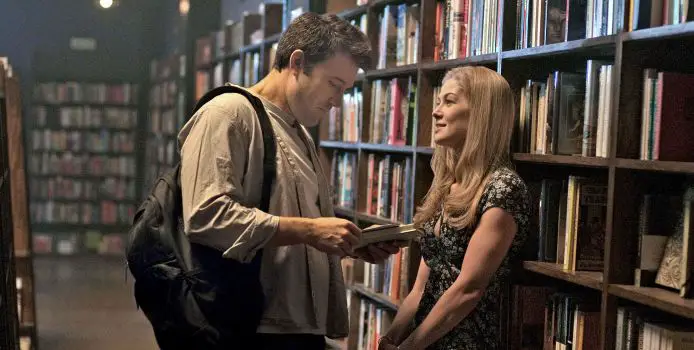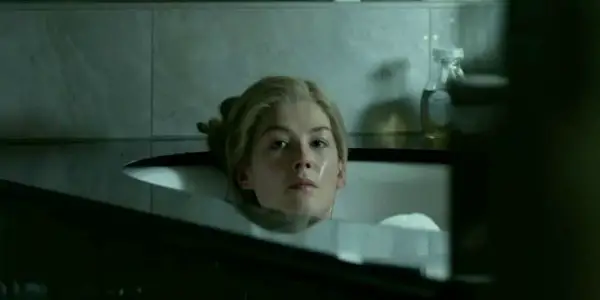GONE GIRL: Post-Modern Hitchc*ck

Ben's milkshake is unisex and brings everyone to the yard.…
If the media blitz preceding its release is anything to go by, Gone Girl is being pitched as brooding, twisty, and somewhat orthodox whodunnit. If you buy a ticket expecting just that, you won’t be disappointed.
David Fincher’s film, based on Gillian Flynn’s novel of the same name, has all the shifty intricacies you’d hope for in a thriller. Calling Gone Girl a ‘thriller,’ though, is akin to labeling the Mona Lisa a mere ‘portrait.’ It ticks all the boxes that the category requires, but beneath the angular machinations that we’ve come to expect in the genre, there’s a surprising emotional depth, deft social commentary and memorable, well-rendered characters.
To describe the events of Gone Girl in too much detail would rob viewers of some glorious, gasp-aloud bends in the plot, but here are the basics: Ben Affleck plays Nick Dunne, a charming author who comes under suspicion after his beautiful yet aloof wife Amy (Rosamund Pike) disappears from their home. As the investigation rolls forward and questions begin to surface, we start to learn about Nick and Amy’s relationship through a series of flashbacks, framed as entries in the missing woman’s journal.
The flashbacks gradually enlighten us about Nick and Amy’s relationship, from the blissful chemistry of their early romance to the troubled days preceding Amy’s mysterious evaporation. The non-linear structure is carefully organized, doling out just enough information to keep things moving while allowing the audience to pass judgement. The measured outlay of information serves one of Gone Girl’s most enjoyable elements – the constant tug-of-war between perception and revelation.
The Perception Game
These days, it’s almost impossible to come into a movie blind. Long before a film hits theaters, we’ve encountered trailers, tweets, early access reviews and *heaven forbid* spoilers. Despite my best efforts to avoid these primers, I went in to Gone Girl loaded with preconceptions – about the genre, the plot, and based on other films I’ve seen, the roles that Affleck and Pike would be asked to play. Rather than fighting these impressions, Gone Girl acknowledges them, reinforces them, and eventually subverts them.
While we’re busy postulating and unraveling the possibilities in Flynn’s narrative labyrinth, David Fincher is making balloon animals with our assumptions. Just when you feel like you’ve figured a character out, Fincher peels back another layer of deceit, challenging the narrative truths that you’ve established. There’s something very satisfying to the repeated conflict: Fincher gives us the time and resources to construct a tidy house of cards, allows us to briefly admire our work, and then unceremoniously knocks it down. It’s deft work from a filmmaker who clearly respects the intelligence of his audience.

Not only is perception vital to how the audience interacts with Gone Girl, it’s also woven into the film’s central question: what does it mean to know someone? Gone Girl stages the question in several different and interesting ways; the first is in the relationship between Nick and Amy. We witness their progression from passionate lovers, to happy newlyweds, to bonded adversaries. As their relationship changes, so does their understanding of one another. Nick’s opening monologue introduces these “primal” questions: “How are you feeling? Who are you? What have we done to each other? What will we do?”
As the lies and secrets in Nick and Amy’s marriage start bobbing to the surface, I found myself asking questions about my own relationships. How large is the rift between our perceptions and reality? How do we change ourselves to meet the expectations of others? Can we ever truly trust another person?
This same conflict is present in Gone Girl’s thoughtful and satiric portrayal of media. Although there are holes in Nick’s alibi from the beginning, it’s a few social faux pas that really incite the ire of those around him. He mistakenly smiles while posing next to his missing wife’s head shot at a press conference, and later takes for a seemingly cheerful selfie with a local attention-seeker. Nick’s perceived lack of grief does more to sway public opinion than the evidence ever could. When Nick eventually reaches out to hot shot defense attorney Tanner Bolt (Tyler Perry) their first move is not to challenge evidence or question the facts of the case, but to embark on a PR charm offensive. Gone Girl highlights the power of modern media and skewers a culture that is far more concerned with comeuppance than justice.
A Field Day for Fincher
Speaking to the New York Times in 2011, Fincher said ,”My idea of professionalism is probably a lot of people’s idea of obsessive.” It’s this trait that makes Fincher’s films so fascinating. Every aspect of the film – from Trent Reznor’s brooding soundtrack to the immaculate production design – brings a single word to mind: meticulous. The attention to detail is perhaps best represented by Fincher’s trademark control of the camera. Fincher’s skill with visual narrative is second to none; every shot tells us something important. That’s not to say he’s bombarding us with information. On the contrary, he seems to be curating the content of every frame. Even things that aren’t directly related to the story feed us information about setting and theme. By the time the opening credits finish, Fincher has vividly described Gone Girl’s setting (a recession-hit Missouri town called North Carthage) without a single line of dialogue.

Given that he’s adapting someone else’s material, it’s impressive that Gone Girl fits so nicely into Fincher’s impressive body of work. What impresses me most about Fincher’s method is his restraint. There are a number of things he does remarkably well, but there are surprisingly few of the stylistic affectations I’ve come to expect from other filmmakers who’ve found their groove in the industry. It doesn’t feel like Fincher because of a particular gimmick or structure or theme – it feels like Fincher because it’s smart, beautifully constructed…and a damn good movie.
Characters Matter
To focus solely on Fincher would be a huge injustice to Gillian Flynn. I haven’t yet read the novel, so I can’t speak to the accuracy of the adaptation, but the story Flynn has created is absolutely gripping. Even more impressive are the characters that inhabit her world. Ultimately, it’s the quality of these characters that makes Gone Girl so fascinating. Each player in the story feels like a human being: flawed, vulnerable, and intelligent. Even the local detectives, who so often fall victim to archetypal treatment in stories like these, are fully fleshed and realistically motivated.
When the narrative careens into pulp territory (as it does for most of the third act), the characters anchor the conflict. Situations become increasingly far-fetched, but the players react to the outrageous circumstances in a true and reasoned way…for the most part. There are a few moments where it seems like Flynn (who wrote the screenplay) is a little too enamored of her original dialogue. A handful of lines feel awkwardly shoveled from manuscript to screen, particularly in Amy’s narrated flashbacks. Lines that may have flourished on the page feel overwrought as spoken dialogue. Luckily, these moments are few and far between.

The average thriller is the cinematic equivalent of a Rube-Goldberg machine – it’s a hell of a lot of fun to watch each outlandish mechanism interact, and the payoff is incredibly satisfying, but once everything has fallen in to place, there’s nothing to keep us coming back. The combination of Flynn’s characters and Fincher’s clever non-linear construction allow Gone Girl to break free of that convention.
Each of Gone Girl’s frequent twists is tied to what we know (or what we think we know) about a character – it has to do with new information rather than an unfounded change in a character’s behavior. Because of this, Gone Girl feels more like a discovery than a blatant manipulation; we’re turning pages instead of running a maze, and the last page matters.
Gone Girl is a hugely satisfying piece of entertainment whose marriage of social commentary and gripping mystery is reminiscent of some of Hitchc*ck’s best work. It will keep you enthralled for every one of its 149 minutes and continue to trouble and challenge your perceptions long after you’ve put the pieces together.
What did you make of Gone Girl’s twists and turns? How well did Fincher and Flynn adapt the novel?
Does content like this matter to you?
Become a Member and support film journalism. Unlock access to all of Film Inquiry`s great articles. Join a community of like-minded readers who are passionate about cinema - get access to our private members Network, give back to independent filmmakers, and more.
Ben's milkshake is unisex and brings everyone to the yard. He'd love to give you more information about it but doesn't work pro bono.













